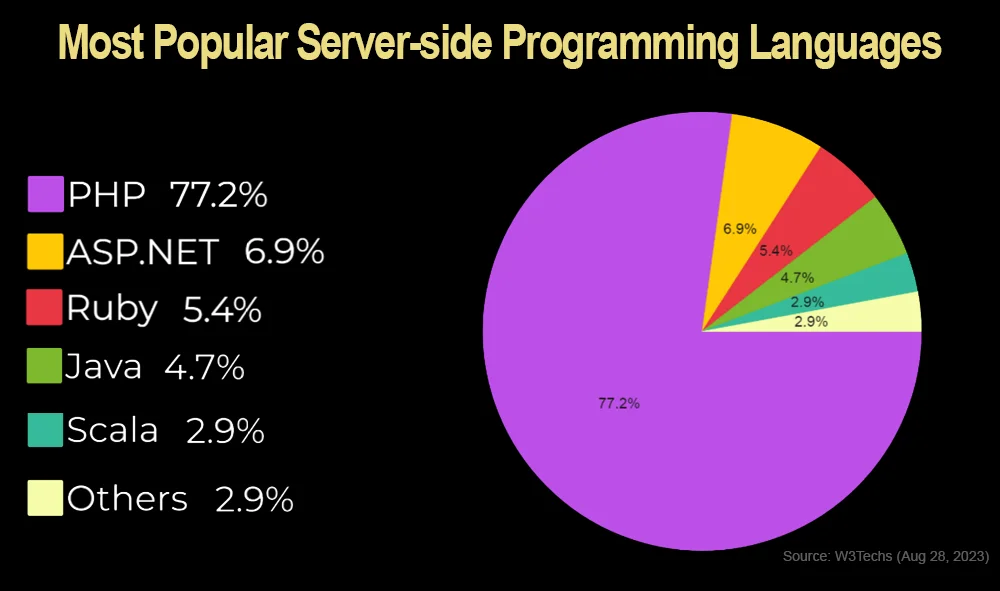Understanding PHP and Reasons for Its Immense Popularity

In the vast world of web development, PHP quietly holds a position of significant importance. In this article, we’ll delve into what PHP is, uncover its current popularity, and explore the distinct advantages that make it a preferred choice in the realm of web programming.
What is PHP?
PHP, which stands for Hypertext Preprocessor, is like a friendly digital handyman for websites. Just like you use tools to construct and shape things in the physical world, PHP is a tool that web developers use to shape websites in the digital world.
Imagine a website as a house. The walls, doors, and windows of this house are like the different parts of a webpage – text, images, forms, and more. But, what if this house could do more than just sit there? What if it could change its appearance based on who visits or even allow you to submit forms and get responses?
This is where PHP comes in. It’s like the magic that happens behind the scenes. Instead of having a static house that never changes, PHP lets developers add some cleverness to the house. It makes the website dynamic, which means it can respond to what you do. For instance, PHP can help create pages that greet you by name, display content based on your preferences, or process your input when you submit a form.
To put it simply, PHP is a language that speaks to computers and tells them what to do with the different parts of a webpage. It’s what allows websites to go from just being a collection of things you can see, to being interactive and engaging places where you can do stuff. PHP is the digital toolkit that helps web developers build websites that can change, respond, and do more than just sit there – turning them into lively, interactive online spaces.
Popularity of PHP
PHP has established itself as a prominent player in the web development landscape. It’s not just a claim; statistics back this up. Roughly 78% of websites on the internet use PHP in some capacity. This statistic speaks volumes about PHP’s wide acceptance and utilization.
The popularity of PHP is evident through surveys conducted among developers. These surveys consistently show PHP as one of the preferred languages among programmers. Job postings seeking PHP developers are abundant, indicating a demand for skilled professionals. Moreover, platforms like GitHub are home to a substantial number of PHP-related projects, highlighting the active engagement of the PHP community.

Advantages of PHP Over Other Web Languages
Ease of Learning and Deployment: PHP features a syntax that is relatively easy to learn, especially if you’re familiar with programming languages like C or Java. This facilitates a smooth transition for developers. Additionally, PHP works harmoniously with various web servers and operating systems, making it hassle-free to deploy.
Open Source Nature: PHP is an open-source language, which means its source code is freely available for anyone to use and modify. This openness promotes collaboration and continuous improvement by a community of developers worldwide.
Wide Hosting Support: PHP plays well with numerous web hosting services, providing developers with a wide range of options. It also integrates seamlessly with databases like MySQL, enhancing its versatility and compatibility.
Frameworks and CMS: PHP boasts a rich ecosystem of frameworks, such as Laravel, Symfony, and CodeIgniter. These frameworks provide pre-built tools and templates, simplifying and expediting the development process.
Server-Side Scripting: PHP’s server-side nature contributes to enhanced security. It processes data on the server before delivering it to users’ browsers, reducing the risk of exposing sensitive information.
Performance and Speed: Contrary to misconceptions, PHP’s performance has greatly improved over the years. Technologies like PHP accelerators and op-code caches optimize its execution speed, resulting in faster loading times for websites.
Scalability: PHP applications are inherently scalable, capable of growing alongside an application’s increasing demands. This scalability is achieved through strategies like horizontal scaling (adding more servers) and vertical scaling (upgrading existing servers).
Vast Community and Resources: The PHP community is vast and active, offering a wealth of resources, support, and talent. Skilled PHP developers are readily available, and the community contributes various libraries, plugins, and tools that enhance PHP’s capabilities.
PHP Powers Prominent Websites and Platforms
Prominent websites and platforms rely on PHP for their functionality. For example, Facebook, one of the world’s most popular social media platforms, started as a PHP project, showcasing the language’s capability to handle massive user traffic. WordPress, a widely used content management system, is also built on PHP, underscoring its adaptability for diverse web applications.
PHP’s popularity is also substantiated by developer surveys from sources like Stack Overflow and JetBrains. These surveys consistently rank PHP among the top programming languages. Furthermore, GitHub hosts a plethora of PHP repositories, indicating a vibrant community actively engaged in developing PHP projects.
PHP remains a steadfast and valuable asset in the world of web development. Its open-source nature, compatibility with hosting services, robust frameworks, and thriving community make it a go-to choice for developers. Whether you’re a seasoned programmer or a newcomer to the coding world, PHP offers a gateway to creating dynamic and engaging web experiences.

